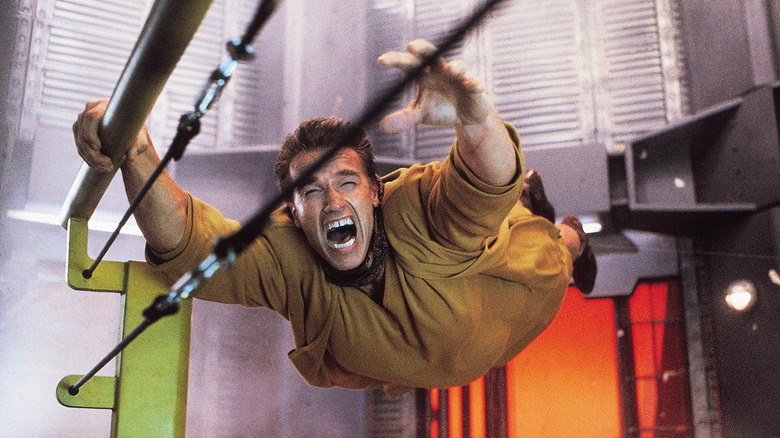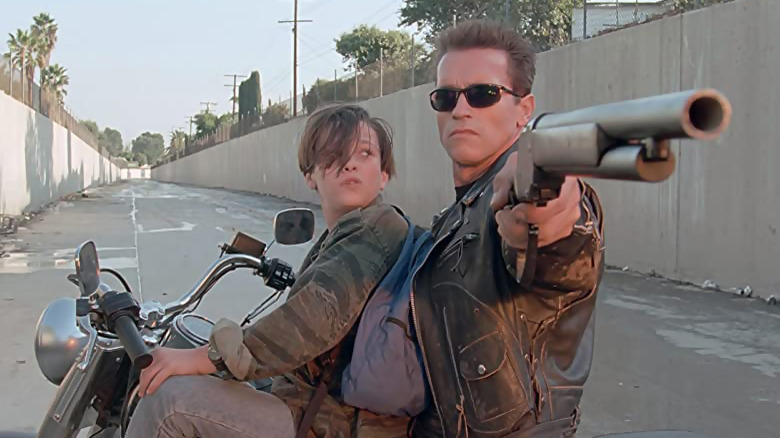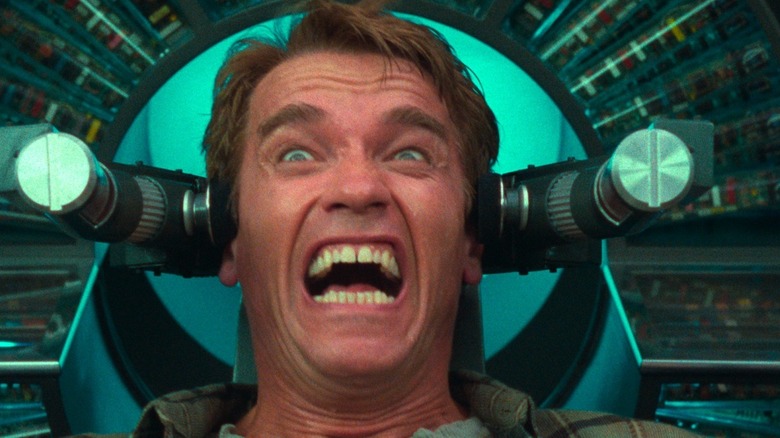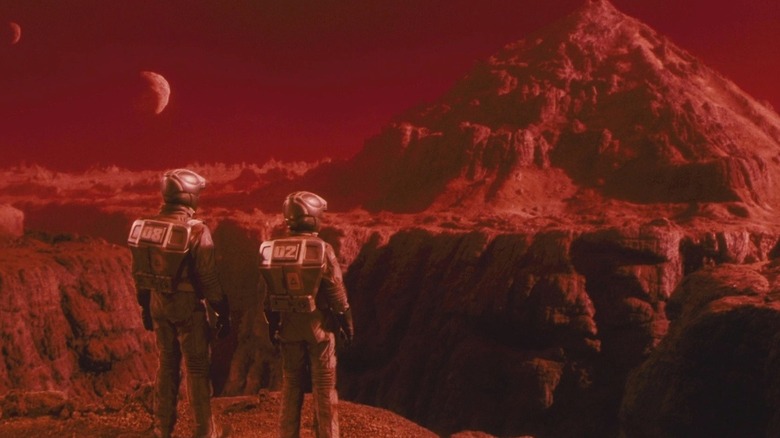We Nearly Saw A Total Recall Sequel - Here's Why It Didn't Happen
The 1990 film "Total Recall" was one of the decade's first smash blockbuster hits and has gone on to become a cult classic. It blasted into theaters with the star power of Arnold Schwarzenegger and a budget that was one of cinema's largest in history at the time. The Philip K. Dick short story adaptation captivated audiences by challenging genre expectations, blending elements from action, sci-fi, and spy films, giving us an action-packed "whodunit" set on Mars.
"Total Recall" was an instant success, raking in more than $25 million in its opening weekend and grossing nearly $120 million total according to Box Office Mojo. The film launched Schwarzenegger into the stratosphere. Coming off a stream of steady hits in the 1980s, Schwarzenegger would become a box office staple in the 90s with hits such as "Terminator 2: Judgement Day" and "True Lies."
Today when a studio sees this kind of early success with a popular young actor, it almost guarantees a franchise. Things were a bit different in 1990, however, and we wouldn't see another "Total Recall" in theaters for another 22 years when the Colin Farrell reboot was released. The mystery remains: Why didn't we get a "Total Recall" sequel?
It seemed like a sure thing
The failure to produce a sequel wasn't purposeful. In fact, several attempts were made. As Gizmodo notes, the book "Tales from Development Hell" discusses why "Total Recall" was ahead of its time. In 1990 sequels were still seen as "commercial debasements that serious artists did not indulge in." One year later, the success of "Terminator 2: Judgement Day" would change Hollywood's opinion on sequels. But by then, it was too late for "Total Recall" as all of the key players involved had moved on to other projects.
As it turns out, another popular sci-fi movie was almost the film's sequel. "Total Recall" screenwriter Gary Goldman optioned the Philip K. Dick short story "Minority Report" to be made as a low-budget feature. When Goldman asked "Total Recall" director Paul Verhoeven to direct it, Verhoeven thought the tone and narrative had a "Total Recall" feel to it and thought it would make a good sequel. Producer Gary Goldman said:
"It seemed like the 'Total Recall' sequel was a sure thing to speed into production, and become another big hit. ... We worked on it together and immediately clicked, and it became a wonderful sequel. Arnold was going to star in it, and Paul Verhoeven was going to direct it."
But then, instead of red carpets, Hollywood red tape interfered. When Carolco Pictures went bankrupt, the rights to the first draft reverted to 20th Century Fox, who decided to remove all the "Total Recall" elements from the first draft and produce "Minority Report" as a standalone movie. The question remains, what did that first draft look like?
What might have been
The plan to insert "Total Recall" elements into Dick's story did seem like a natural fit. In "Minority Report" humans born with telepathic abilities, called "pre-cogs," are used by the government to predict crime before it happens. In the book "Tales from Development Hell" Verhoeven described the plot of the "Total Recall" sequel:
"There was an introduction (in "Total Recall") that the mutants were perhaps clairvoyant, and that was used in the idea for the second one where Quaid becomes the head of this company that can look into the future and protects citizens by eliminating criminals before they do the crime."
There was another close call in 1997. On the heels of the success of "Scream," Dimension Films purchased the film rights to "Total Recall" and Gary Goldman was again tasked with writing the script. As Goldman described it:
"They knew what they liked in the original movie: they wanted to keep it as a popcorn movie with lots of cool stuff, but they also liked the 'is it real or is it Memorex?' theme ... It was a high wire act where we would confirm that it was real on Mars, then use a narrative device to make it seem like he was on Earth or still in the Rekall chair, and then use an even more clever device to put him back on Mars."
This time, the project was halted by an unlikely source: Arnold himself.
"I won't be back"
After reading the completed script, Schwarzenegger thought the premise was too complicated and turned down the opportunity to reprise the role of Quaid. Dimension got close again in 2000 with yet another script, and Schwarzenegger again turned them down, opting to make "The 6th Day" instead.
Though the film was rebooted in 2012 with plenty of wink-wink references to the 1990 film, the closest thing we have to a sequel continues to be the short-lived 1999 Showtime series "Total Recall 2070." Unfortunately, the series didn't feature any characters or storylines from the film and resembled "Blade Runner" more than "Total Recall," with self-aware androids and an industrial noir futuristic setting on Earth.
The reasons why a "Total Recall" sequel was never made played out like a Hollywood narrative. From contractual trouble to Schwarzenegger's reluctance, "Total Recall" was ultimately passed around Hollywood like a hot potato rather than a hot commodity. As the last pre-CGI blockbuster, the film remains a standalone classic. Despite several opportunities, when it came to "Total Recall" Schwarzenegger could never commit to saying, "I'll be back."



